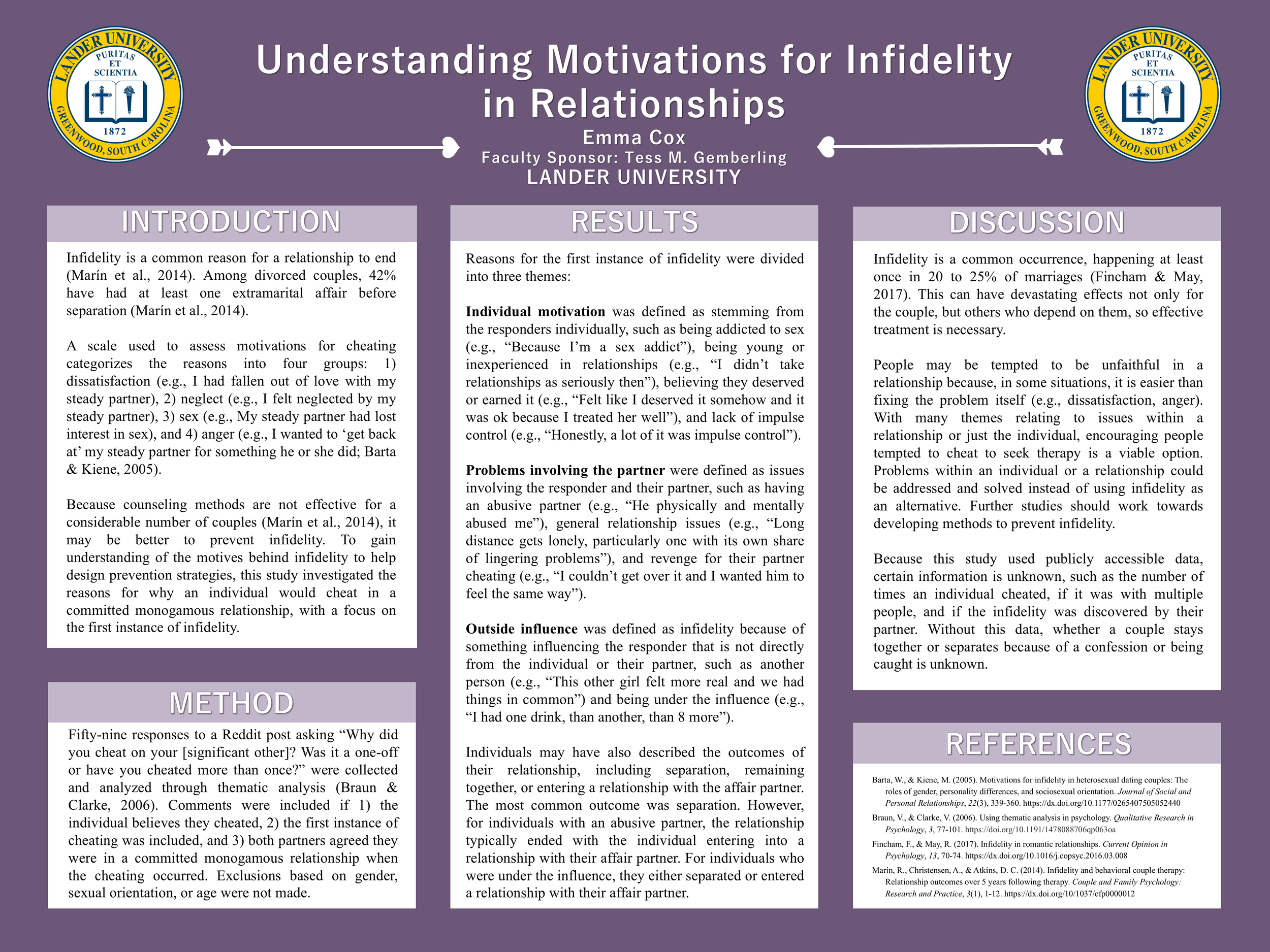Multidisciplinary Poster Session
Psychology, Sociology, & Interdisciplinary Studies
held on April 24, 2025 at the Lander University Academic Symposium
Faculty Sponsors: Tess Gemberling - Zach Rubin - Shana Southard-Dobbs - Lillian Craton
Presenters: Annabel Budreau - Sydni Cooks - Emma Cox - Lauren Gouge - Carly Smith
Scroll to view all projects!
-
![]()
Annabel Budreau
Click here for a closer look at the poster.
Child-On-Child Sexual Abuse: An Uncomfortable Reality
Adverse Childhood Experiences (ACEs) are stressful and potentially traumatic life events experienced before age 18. ACEs are associated with poor behavioral, physical health, and mental health outcomes such as risky behaviors (drinking/smoking /incarceration), higher risk for educational/employment setbacks, lower life satisfaction, poorer psychological wellbeing, and poorer physical health (Bellis et al., 2013). One subset of ACEs that is common but underreported is child-on-child sexual abuse (Queensland Government, 2024). Studies suggest that child-on-child sexual abuse accounts for approximately one-third of all sexual abuse encounters (Allardyce & Yates, 2018). This poster will explore the different facets of child-on-child sexual abuse, including what it is, who is involved, and potential points of intervention. I will explore the role that law enforcement, social services (e.g. Department of Social Services and Child Advocacy Centers), and the court systems play in identifying and addressing the issue, in addition to identifying gaps in current reporting and intervention mechanisms. Then, I will seek to formulate possible solutions and next steps to address the issue at a systemic level. Understanding and addressing this issue has the potential to impact the rates of subsequent sexual offending as well as recidivism through the victim-to-victimizer hypothesis (Drury et al., 2019).
Additional Resources:
Annabel Budreau is a senior Psychology major and Criminal Justice minor from Greenwood, SC. Some of her accomplishments include being a part of the Honors College, Psi Chi (The International Honor Society in Psychology), Tau Upsilon Alpha (National Organization for Human Services), Alpha Phi Sigma (The Criminal Justice Honor Society), Sigma Alpha Pi (The National Society of Leadership and Success), the social media coordinator for the Psychology Club, and is a Research Assistant in Dr. Southard-Dobbs’s Stress and Cognition Lab. She completed a summer 2024 internship with the U.S. Department of Justice and after graduation she plans to pursue employment in law enforcement.
-
![]()
Sydni Cooks
AI in Education: Enhancing Teaching and Learning through Technology
The study examines the benefits and challenges associated with generative AI tools, including text generators and interactive learning models, to enhance student engagement, aid with administrative tasks, and promote innovative teaching strategies this study was conducted on Lander University Students. The findings highlight the specific use of AI tools by professors at Lander University and the implications of these findings for broader applications in education. The study discusses students' perceptions of AI’s role in their education, the potential applications of AI in the future, and the ethical considerations, particularly regarding academic integrity.
Sydni Cooks is a Junior majoring in Human Services and minoring in Psychology, Sociology, and Pre-Social Work from Greenwood, SC. She plans to pursue her Master's in Social Work after graduation.
-
![]()
Emma Cox
Click here for a closer look at the poster.
Understanding Motivations for Infidelity in Relationships
Infidelity is a common cause for a relationship to end with 42% of divorced couples having at least one extramarital affair before separating (Marín et al., 2014). Because counseling methods to repair damage from infidelity are not effective for a considerable number of couples, it may be better to prevent infidelity instead. To gain an understanding of the motives behind infidelity to help design prevention strategies, this study investigated the reasons for why an individual would cheat in a committed monogamous relationship, with a focus on the first instance of infidelity. A thematic analysis was done on a Reddit post that divided motivations for cheating into three themes. The first theme was individual motivation which can be defined as infidelity because of issues with the responders. Examples of this are being addicted to sex, being young or inexperienced in relationships, believing they deserved or earned it, and lack of impulse control. The second theme was problems involving the partner which can be described as infidelity because of their partner or issues involving the relationship between the responder and their partner. Examples of this include having an abusive partner, being dissatisfied in the relationship, and revenge for their partner cheating. The third theme was outside influence which can be defined as infidelity because of something affecting the responder. Examples of this are attraction to the infidelity partner, and being intoxicated. Using the identified themes, treatment can be developed to better fit the individual and couple to decrease the likelihood of infidelity.
Emma is a junior psychology major and human services minor at Lander University and plans to obtain a masters in family and marriage counseling. She is an honors student, president of Lander’s chapter of Psi Chi, as well as a research assistant for Dr. Southard-Dobb’s stress and cognition lab.
-
![]()
Lauren Gouge
Click here for a closer look at the poster.
Benefits of Equine Assisted Therapy for People with PTSD
The benefits of equine assisted services for people with PTSD have been supported by several studies. Equine therapy is helpful for people because it allows them to see in the horses what is actually going on with them personally. The horses pick up on what the person is feeling, and sometimes the horse will demonstrate how frustrating it can be to deal with someone or something that is expressing these emotions in the wrong way. It allows the people struggling to see what it is like to deal with that, and how to comfort the horse in order to get them to listen. It is shown that human-horse interaction has helped with emotional healing, trust building, and enhanced coping skills. There does need to be more research done in order to validate the findings in other studies done. One problem that is seen in many of the studies is that the study sample sizes are small; they need to to include more people in the studies to be able to get a better idea of if the effects they are seeing in a few people can be replicated with many people.
Lauren Gouge received a bachelor’s degree in education from North Greenville University in 2024. She is earning a second degree in IDS: Therapeutic Horsemanship and Education.
-
![]()
Carly Smith
Click here for a closer look at the poster.
Reactions and Questions Aimed at People Sexually Attracted to Teenagers: A Thematic Analysis
Female sex offenders are under researched in comparison to their male counterparts. Therefore, this research aims to explore people’s reactions to and questions for those who are sexually attracted to teenagers, when compared by perpetrator sex. These reactions and questions were gathered from two individual reddit threads created by a person sexually attracted to teenagers, one male and one female. The male thread had predominately neutral and negative comments, while the female thread had a large majority of positive comments. The comments under the female thread tended to be sexual in nature, while the comments under the male thread were not. Subthemes for both threads were identified. There are many myths and stereotypes about who can and cannot commit a sexual crime or be considered a sexual predator. This research brings attention and awareness to how people respond to sexual attraction to teenagers when reported by a male versus a female. Because females receive more permissive attitudes, such responses may encourage them to act on their sexual attraction and even avoid consequences for their behaviors more often than their male counterparts.
Carly Smith is a junior psychology major, a human services minor, and a criminal justice minor. She is from Chesterfield, SC, and is a member of the Psychology Club. After graduation from Lander University, she plans to attend graduate school for clinical psychology.




